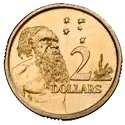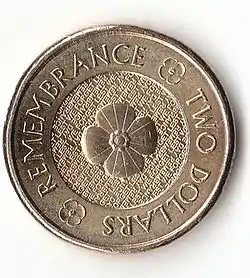Australian two-dollar coin
The Australian two-dollar coin is the highest-denomination coin of the Australian dollar. It was first issued on 20 June 1988, having been in planning since the mid-1970s. It replaced the Australian two-dollar note due to having a longer circulatory life.[1] The only "mint set only" year was 1991. The one-dollar and two-dollar coins are legal tender up to the sum of not exceeding 10 times the face value of the coin concerned.[2]
Australia | |
| Value | 2.00 AUD |
|---|---|
| Mass | 6.60 g |
| Diameter | 20.50 mm |
| Thickness | 2.80 mm |
| Edge | interrupted milled 20 notches |
| Composition | 92% Copper, 6% Aluminium, 2% Nickel |
| Years of minting | 1988–present |
| Obverse | |
| Design | Queen Elizabeth II |
| Designer | Ian Rank-Broadley |
| Design date | 1999 |
| Reverse | |
 | |
| Design | Male Aboriginal Elder |
| Designer | Horst Hahne |
| Design date | 1987 |
Design
In accordance with all other Australian coins, the obverse features the portrait of the reigning monarch, who during the lifetime of the coin has only been Queen Elizabeth II. From 1988 to 1998 the portrait of her was by Raphael Maklouf before being replaced in the following year by one sculpted by Ian Rank-Broadley.[3] Since 2019, the effigy of Elizabeth II by artist Jody Clark has been released into circulation.
Designed by Horst Hahne, the reverse depicts an Aboriginal Elder, a Walpiri-Anmatyerre man of the Northern Territory of Australia, inspired by an Ainslie Roberts drawing of Gwoya Jungarai (Tjungarrayi) known as One Pound Jimmy.[4][1] Tjungarrayi was one of the only survivors of one of the last recognised massacres of Aboriginal people by the British- the 1928 Coniston massacre in central Australia. However, the design is ‘not intended’ to depict any person in particular.[5] The design also incorporates the Southern Cross and native grasstrees. The initials of its designer, Horst Hahne, were removed from the design from 1990 onwards. 1988 and 1989 are the only year dated two dollars with the initials.[1]
All two-dollar coins have been struck at the Royal Australian Mint in Canberra. 160.9 million coins were minted in the first year of issue.[1] It has been issued in all years since except 1991,[1] with an average mintage of 22 million coins per annum from 1989 to 2008.

In 2012, the Australian mint released the first ever different designed two-dollar coin. It features a poppy flower, with the words Lest we Forget and Remembrance Day in the background of the coin. There had been no commemorative designs for this issue, until the 2012 Remembrance coin was minted. Along with the 2012 Remembrance coin was a coin with the same text and image but the centre poppy was red with a black centre. It was therefore the first coloured circulating coin in Australia.
On 21 June 2013, a third commemorative two-dollar coin was launched by the Royal Australian Mint. This coin, commemorating the 60th anniversary of the coronation of Queen Elizabeth II, featured a purple circle bordering St Edward's Crown.[6]
As a part of the 100 years of Anzac Day a coin programme launched by the Royal Australian Mint, two separate coloured coins were released. The first was released in 2014, it featured two green circles in the middle of the coin and a dove in the centre. The word Remembrance was stretched across the top of the coin. In 2015, the fourth circulating coloured coin in Australia was released. It includes red stripes much like the 2013 Queen Coronation coin. It also features five crosses amongst poppies and the words Lest we Forget in the centre. A fifth coin was also released in 2015. It is sunset orange and it features a sun in the centre with birds and the Flanders Field poem in the background.
In 2016 a commemorative coin was issued for the Rio Olympic Games. Five Coins were issued for circulation via Woolworths and were made available in packs of the 5 coins on the 27 July 2016. A Paralympic Games coin was issued on the 22 August 2016.[7]
When the coin was introduced there were complaints that the coin was too small for its value and was easily lost, or counterfeited by placing two 5 cent pieces together and colouring them gold. However, with an uninterrupted milling on the 5-cent, and the 2 dollars having 5 grooves in 4 lots separated by 7 mm length of the side, identification is easy. It has the same size and milling as the 10 Swedish kronor.
Its smaller size in comparison to the $1 coin can lead to confusion for visitors from outside Australia.
Minting figures
The coin has only been struck at the Royal Australian Mint in Canberra, the nation's capital. The only year without production was 1991 (due to the large number issued for the coin's introduction in 1988).[1]
| Year | Mintage | ||
|---|---|---|---|
| 1988* | 160,900,000 | ||
| 1989* | 31,600,000 | ||
| 1990 | 10,300,000 | ||
| 1991 | - | ||
| 1992 | 15,500,000 | ||
| 1993 | 4,900,000 | ||
| 1994 | 22,100,000 | ||
| 1995 | 15,500,000 | ||
| 1996 | 13,900,000 | ||
| 1997 | 19,000,000 | ||
| 1998 | 8,700,000 | ||
| 1999 | 27,300,000 | ||
| 2000 | 5,700,000 | ||
| 2001 | 35,600,000 | ||
| 2002 | 29,700,000 | ||
| 2003 | 13,700,000 | ||
| 2004 | 20,000,000 | ||
| 2005 | 45,500,000 | ||
| 2006 | 40,500,000 | ||
| 2007 | 26,000,000 | ||
| 2008 | 47,000,000 | ||
| 2009 | 74,500,000 | ||
| 2010 | 36,500,000 | ||
| 2011 | 1,800,000 | ||
| 2012 | 5,900,000 | ||
| 2013 | 35,100,000 | ||
| 2014 | 39,900,000 | ||
| 2015 | 22,000,000 | ||
| 2016 | 12,900,000 | ||
| 2017 | 16,400,000 | ||
| 2018 | 14,600,000 | ||
| 2019 | IRB 9,000,000
JC 2,000,000 | ||
| "*" denotes that coins were minted with the designer's initials | |||
| References: [1] | |||
Commemorative coins
| Year | Subject | Colours/Features | Mintage |
|---|---|---|---|
| 2012 | Poppy | None | 5,800,000 |
| Red | 500,000 | ||
| 2013 | 60th Anniversary of Queen's Coronation | Purple | 1,000,000 |
| 2014 | Remembrance Day | Green | 1,850,000 |
| 2015 | 100 Years of ANZACs | Red | 1,460,000 |
| In Flanders Field | Orange | 2,150,000 | |
| 2016 | 50 Years of Decimal Currency | Pre-decimal Crown on obverse | 2,880,000 |
| 2016 Rio Olympics** | Blue | 2,000,000 | |
| Black | |||
| Red | |||
| Yellow | |||
| Green | |||
| 2016 Rio Paralympics | Green/Yellow/Red/Blue | ||
| 2017 | Lest We Forget | Blue/Green/Yellow | 3,900,000 |
| Possum Magic** | Pink/Purple/Orange/Blue | N/A | |
| Red/Orange/Purple/Yellow/Blue | |||
| Blue/Navy/Pink/Orange/Green | |||
| Remembrance | Green/Purple rosemary. | 2,100,000 | |
| 2018 | 2018 Commonwealth Games | Red | TBA |
| Green | |||
| Blue | |||
| Eternal Flame | Blue/Orange | 3,400,000* | |
| 2018 Invictus Games | None | TBA | |
| 2019 | Armistice of 11 November 1918 | Red | TBA |
| Mr. Squiggle** | Turquoise/Yellow/Red | TBA | |
| Yellow/Orange/Green | |||
| Pink/Orange/Green | |||
| Blue/Black/White | |||
| 2020 | ICC Women's T20 World Cup | Yellow/Blue/Purple | TBA |
| 30th Anniversary of National Police Remembrance Day | Blue/White | TBA | |
| "*" denotes partial numbers - total production to be confirmed | |||
| "**" denotes release through Woolworths Supermarkets | |||
| References: [1][7][8][9] | |||
See also
References
- "Two Dollars". Royal Australian Mint. Australian Government. 8 January 2016. Retrieved 30 August 2017.
- "RBA Banknotes: Legal Tender". banknotes.rba.gov.au. Retrieved 24 July 2018.
- "Heads or Tails". Royal Australian Mint. Retrieved 18 July 2019.
- Ian W. Pitt, ed. (2000). Renniks Australian Coin and Banknote Values (19th ed.). Chippendale, NSW: Renniks Publications. ISBN 978-0-9585574-4-3.
- Royal Australian Mint - Frequently Asked Questions - About Australian Coins
- "Governor-General launches Australia's first purple striped coin".
- "Woolworths shoppers win gold with exclusive Olympic coin launch" (Media release). Royal Australian Mint. Australian Government. 19 July 2016. Retrieved 30 August 2017.
- Jacka, Monty (13 February 2019). "He's Mr Squiggle, he's back and on a coin near you". Sydney Morning Herald. Archived from the original on 8 March 2019. Retrieved 16 March 2019.
- "Mr Squiggle & Friends 2019 Coin Collection". Woolworths. Retrieved 16 March 2019.
External links
| Preceded by Two Dollar Note (Australian) |
Two Dollars (Australian) 1988–present |
Succeeded by Present |